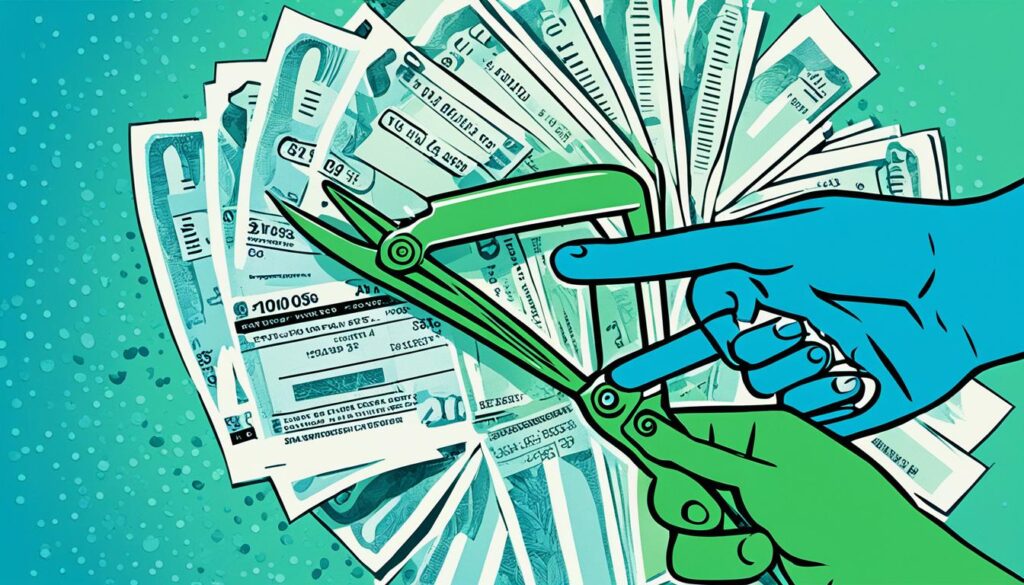Saving money with a low income can seem hard, but it’s possible with smart steps. Start by making a budget with all your income sources. These can be jobs, side gigs, and benefits among others.
First, cover your basic needs: food, house, utilities, and getting around. Use a zero-based budgeting method to give every dollar a job. Learn more about it here.
Spend less on things you don’t really need. Try eating out less and buying fewer new clothes. Sell things you don’t use for extra cash. Be smart about what you must spend on needs.
Earn more to better your money situation. Try extra work, ask for a raise, or find a better job. Start saving $1,000 for emergencies to avoid debt when unexpected costs happen.
Update your budget as money in and out changes. Staying on top of this helps you save better. With focus and giving things up, saving on a small income can lift you up.
Understanding the Importance of Budgeting for Low Income Savers
Looking closely at how much money you make and spend each month is key. Using budget tricks can help turn tough money situations into chances for a stable life. It’s crucial to know what you really need to pay for first to keep your budget right.
Choosing a zero-based budget is great for guiding your money wisely. Whether it’s for saving, buying things, or paying off debts. This way, you make a budget that fits a simple life and helps save money. Also, budget calculators can help plan your money better when your income changes.
Cutting down on costs helps you stay in charge of your money. By carefully watching what you spend and adjusting, you can manage your money better. So, using smart budget strategies is not just good for planning. It also helps you live a secure and stable financial life.
Smart Ways to Reduce Monthly Expenses

Try cutting down on things you don’t need. This is a key cost cutting tactic. Think about using fewer streaming services. When grocery shopping, stick to a list to avoid buying on impulse. Use apps like Flipp to find great deals. This is smart shopping.
Eating out a lot can be expensive. Instead, eat out only on special occasions. Use community events for fun, rather than spending a lot. Also, save gas by doing all errands in one trip. Remember to use special occasions to cut costs even more.
Using thrifty strategies helps lower your monthly bills a lot. With these economizing methods, you can manage your money well. This leads to a more secure financial future.
Practical Tips for Frugal Living
Frugal living boosts your financial health. The 30-day rule helps avoid unnecessary buys. By pausing non-essential purchases for 30 days, you see what you truly need. This tactic is a key part of saving smartly and stops impulse shopping.
Using cash-back and discount apps also saves money. Apps like Honey and Rakuten give rebates on what you buy. Plus, using tools like Camelizer for big purchases ensures you get the best deals.
DIY gifts are budget-friendly and meaningful. Making gifts saves cash and adds a special touch. Also, shopping at thrift stores stretches your dollar. You get quality items for less money, helping your budget go further.
Setting a budget is key. It should cover needs, wants, and savings. Review bills and yearly costs to cut wastes or find better deals. Knowing what’s essential helps avoid overspending, which is vital for tight budgets.

Cleaning out clutter can also make money. Selling things you don’t need supports a simple, frugal life. It’s smart to choose quality over price when shopping. Good items last longer, saving money in the end.
Smart buying tactics help save more. Use warranties, price matching, and coupons. Using credit smartly, not for extra spending, helps manage finances better. This supports saving more money over time.
Boosting Your Income Through Different Strategies
Today, improving your earnings is key to stretching your budget. Trying out side hustles You can drive for ride-sharing apps in your free time. Another idea is to work extra hours at your job.
If you’re good at something, think about freelancing. Freelancing lets you offer services like writing or design. Over time, you can make good money by building a client list. Also, consider asking for a raise. Show your boss how valuable you are.
Sometimes, finding a new job can be a good move. If you’re not happy or want more money, look around. The right job can make budgeting easier. Remember, adding these methods with smart financial advice helps a lot.
Saving Money on Essential Expenses
Lowering essential costs is key for saving on a tight budget. Look at your housing costs first. Think about downsizing, talking about lower rent, or living with others to save money. For getting around, try public transport, biking, or sharing rides. Regular car care can also save you from big repair bills later, showing smart ways to spend less.
Eating takes a big chunk of your budget too. Plan your meals, make a shopping list, and stick to it to avoid buying extra stuff. Use coupons and loyalty cards for more savings. Cooking at home instead of eating out saves money and keeps meals healthy and tasty. Using apps like Flipp helps you find the best deals and save more.
Staying healthy is vital to avoid big medical bills. Exercising regularly, eating well, and getting check-ups help keep healthcare costs low. Stop smoking and drinking too much. It’s better for your health and your wallet. Make sure to pay bills on time to avoid late fees. This helps you manage your money well and keeps your savings growing.
